- Home
- McBain, Ed
Killer's Payoff Page 12
Killer's Payoff Read online
Page 12
“Yes. You thinking of the Mencken woman?”
“Um-huh.”
“A guy named Jason Poole took her pictures.”
“Sure. But she thinks they’re in somebody else’s hands now, somebody who took over from Kramer.”
“Kettering?”
“Who knows? I’ll tell you one thing.”
“What’s that?”
“I’m very anxious to talk to this guy. I think he may have a lot of the answers.”
Hawes nodded. “There’s just one thing, though, Steve,” he said.
“Um? What’s that?”
“We’ve got to find him first.”
12.
PHIL KETTERING’S OFFICE was on one of the side streets of midtown Isola, off Jefferson Avenue. There were a good many big and prosperous firms with offices in the building. Phil Kettering’s was not one of them.
His office was at the end of the hall on the third floor, and his name was on the center of the frosted-glass door, and the word PHOTOGRAPHER was lettered in the lower right-hand corner just above the wooden portion of the door.
The office was locked.
Carella and Hawes found the superintendent of the building and asked him to open the door for them. The super had to check with the building management. It took forty-five minutes from the time of the request to the actual opening of the door.
The office was divided into three sections. There was a small room with a desk and filing cabinets in it. There was another room in which Kettering undoubtedly took his pictures. And there was a darkroom. The office did not carry the sweet smell of success. Neither did it carry any dust. Each night, the building’s cleaning woman came in to empty the waste baskets and wipe off the furniture. The office was spotlessly clean. If Kettering had been there recently, the cleaning woman had wiped away all traces of his visit.
There was no mail outside the entrance doorway. There was a pile of mail inside the door, just below the mail slot. Several printed postal forms in the pile informed Kettering that the post office was holding packages too large to put through the slot. In the silence of Kettering’s office, Carella and Hawes illegally opened his mail. There was nothing significant in the pile. All the letters had to do with his business. Even the manila envelopes contained photographs that were coming back from magazines. The photos were not of the cheesecake variety. Nor did any of Kettering’s mail indicate that he was fond of photographing girls. His forte, apparently, was do-it-yourself pictures. Most of the correspondence was from service magazines, and all of the photos in the manila envelopes dealt with subjects like “How to Put up a Hammock,” and “Refinish That Old Table!” The photos showed how to do it, step by captioned step. If there was a connection between Kettering and Lucy Mencken, it seemed rather remote at the moment.
There were some opened letters on the desk in the smallest room. The letters were dated the latter part of August. None of them had been answered. Evidently Kettering had opened these before he left for his hunting trip. Some of the new letters were letters wanting to know why a request made in August had not yet been answered.
A workbench had been set up under the lights in the studio room. A paint brush with a hole drilled through the center, a long stiff wire, and an empty coffee tin were on the center of the workbench. A plate was in the camera, loaded with film, ready to go. In the darkroom, there were negatives and prints of the first stages of the do-it-yourself project Kettering had been shooting. This one was teaching the reader how to keep a paint brush in good order by drilling a hole, putting the stiff wire through it and using the wire to support the brush over the coffee tin without bending the bristles. The photographic essay had not been finished. Apparently Kettering’s hunting trip had intruded upon its completion.
Apparently, too, Kettering had not been back to his office since last August.
Carella left the office with Hawes, and both men went down to see the building manager. The building manager was a well-groomed man in his thirties. He seemed unhurried and unruffled. His name was Colton.
“I’m going to dispossess him,” Colton said. “Hell, he hasn’t paid his rent for all these months. That office is losing revenue for me. I’m going to dispossess him, that’s all.”
“You sound as if you don’t want to,” Carella said.
“Well, Phil Kettering’s a nice fellow. I hate like hell to throw him out into the street. But what can I do? Can I continue to lose revenue? He’s skipped town, so I lose money. Is that fair?”
“How do you know he’s skipped town?”
“He’s not around, is he? I’m going to dispossess him, that’s all. I called the building’s lawyer already. We’re going to post a copy of the summons and complaint on the office door. We can stick it there with Scotch tape or with a tack, the lawyer said. That’s called ‘substitute service’ in this state.”
“Will you sue him for the back rent?” Hawes asked.
“How can I get a judgment for the back rent?” Colton asked. “He has to be served papers in person for that and who the hell knows where he is? But I can get a judgment evicting him. Substitute service. That’s what they call it in this state. I hate to do it to Phil, but can I lose revenue? You can bet your life the building doesn’t like to lose revenue.”
“Did Kettering give you any idea he was leaving?” Hawes asked.
“None whatever. How do you like that? Skips town. Doesn’t even have the decency to tell me he doesn’t want the office any more. What’s he hiding from? Is it the police? Is he hiding from you? Is he planning a bank robbery or something? A murder? What? Why does the man suddenly skip town like that? That’s what I’d like to know.”
Carella and Hawes nodded almost simultaneously.
Carella said it for both of them. “That’s what we’d like to know, too,” he said. Then they thanked him and left his office.
There was nothing to do but question the other men who had been on the hunting trip.
They divided the men between them, and then Carella and Hawes split up.
* * *
THE ADVERTISING AGENCY was called the Ruther-Smith Company. It was a going concern, with twenty employees. Frank Ruther was a partner in the firm, and the man who wrote most of the company’s copy.
“I’d rather be writing books,” he told Hawes. “The trouble is, I can’t.”
He was a man in his early forties, with dark hair and brown eyes. He did not dress at all like a Jefferson Avenue advertising man. He dressed, instead, like the stereotyped idea of an author, tweed jacket, soft-collared shirt, quiet tie, dark flannel trousers. Too, like someone’s stereotyped idea of a writer—perhaps his own—he smoked a pipe. He had greeted Hawes cordially and warmly, and they sat now in his tastefully furnished office, talking and smoking.
“My grandfather made a hell of a lot of money,” Ruther said. “He sold pots. He traveled from town to town selling his pots, and pretty soon he could afford to hire people to sell his pots for him. He left a lot of money to my dad.”
“What did your father do?” Hawes asked.
“He parlayed it into even more money. He was a dog fancier. He began importing French poodles. It doesn’t sound as if there could be much money in it, but he had the biggest kennel on Sand’s Spit. Quality dogs, Mr. Hawes. And my dad was a shrewd businessman. When he died, I inherited money earned by two generations of Ruthers.”
“What did you do with it?”
“I wanted to be a writer. I wrote dozens of novels, which I threw into the wastepaper basket. At the same time, I was living big. I’d always lived big when my father was alive, and I saw no reason to stop living big when he died. I went through quite a lot of money. In a little less than twenty years, I spent almost the entire fortune two generations had worked to build. I stopped writing novels when I had about fifteen thousand dollars left. I started this company with Jeff Smith. It’s earning its keep now. I’m beginning to feel as if I’m finally accomplishing something. It’s a bad feeling, Mr. Hawes, when yo
u know you’re not accomplishing anything.”
“I suppose so,” Hawes said.
“A good copywriter could outline the history of my family in three words, if he wanted to. At least, the history of my family until I started this agency—when I was still fooling around writing books.”
“And what are those three words?” Hawes asked.
“My grandfather, my father, and me,” Ruther said. “Three generations and three occupations. The three words? A peddler, a poodler, and a piddler. I was the piddler.”
Hawes smiled. He had the feeling that Ruther had used these words many times before, and that his seeming originality was not at all spontaneous. He felt, nonetheless, that it was clever—and so he smiled.
“I’m not a piddler any more, Mr. Hawes,” Ruther said. “I write copy for my firm now. I write damned good copy. It sells the product. Jeff and I are making money at last. Not money I inherited. Money I worked for. Money I worked damned hard for. It’s a good feeling. It’s the difference between being a piddler—and a man.”
“I see,” Hawes said.
“I’m sorry,” Ruther said graciously. “I didn’t mean to take up your time with a family portrait.”
“It was very interesting,” Hawes said.
“But what did you want to know?”
“What do you know about Phil Kettering?”
“Kettering?” Ruther’s brow creased. He looked at Hawes in puzzlement “I’m sorry. I don’t think I know the name.”
“Phil Kettering,” Hawes repeated.
“Should I know him?”
“Yes.”
Ruther smiled. “Can you give me a clue?”
“Kukabonga Lodge,” Hawes said.
“Oh! Oh, for God’s sake, yes. Of course. Forgive me, please. I’m not good on names. Especially at that time…well, I was in something of a fog. I’m afraid nothing made a very clear impression on me.”
“What kind of a fog?”
“My wife and I were having trouble.”
“What kind of trouble?”
“Personal trouble. We thought we might split up.”
“Have you?”
“No. We’ve worked it out. Everything is fine now.”
“About Kettering. When did he leave Kukabonga?”
“Early one morning, I forget which day it was. He said he wanted to do a little shooting before hitting the road. He had his breakfast, and then left.”
“Anybody go with him?”
“No, he went alone.”
“Then what?”
“Well, we had our breakfast, and then we went out.”
“Who?”
“Me and the two other fellows who were there. I don’t remember their names.”
“There were three other fellows, weren’t there?”
“Kramer, you mean? Yes, he was the third fellow. But he didn’t come with us that morning.”
“Why not?”
“I’d had an argument with him the day before.”
“What about?”
“Clams.”
“You remember Kramer’s name, don’t you?”
“Yes. Because we had the argument.”
“Did you see anything about him in the papers recently?”
“No. Why?”
“He’s dead.”
Ruther was silent for a moment. “I’m sorry to hear that,” he said at last.
“Are you?”
“Yes. We’d had an argument, true, but that was a long time ago, and I was touchier than I should have been. Because of the trouble Liz and I were having. I certainly wouldn’t wish his death.” Ruther paused. “How did he die?”
“He was shot.”
“You mean accidentally?”
“Purposely.”
“Oh.” Ruther paused again. “You mean he was murdered?”
“That’s what I mean.”
“Who did it?”
“We don’t know. Have you seen Kettering since last year?”
“No. Why should I? He was a stranger. I only met him at the lodge.”
“Then you wouldn’t know where he is now?”
“No, of course not. Did he have something to do with Kramer’s death?”
“We understand Kettering took your part in the argument and that he and Kramer almost came to blows. Is that right?”
“Yes, that’s right. But that was a long time ago. You can’t believe he’d harbor a grudge all this time.”
“I don’t know what to believe, Mr. Ruther. Can you remember the names of the other two men who were on the trip?”
“No, I’m sorry, I can’t. One of them had a very strange name, but I don’t remember what it was.”
“I see. When did you leave the lodge?”
“On a Saturday, I think.”
“Do you remember the date?”
“The eighth or the ninth, I guess. This was the first week in September.”
“When did Kramer leave?”
“The same day, I think.”
“And the other men?”
“We all left at the same time, I believe. We’d only gone up there for a week. I’m a little hazy on all this because I was more concerned with my wife than with hunting. The only thing I shot all the while I was there was a crow.”
“Did Kettering threaten Kramer’s life?”
“No. He asked him to step outside with him. That was all.”
“Did he seem very angry?”
“Yes.”
“Angry enough to kill?”
“I don’t know.”
“Mmmm.”
“Why do you think Kettering killed Kramer?”
“We’re not sure he did, Mr. Ruther. But he did have a possible motive, and he seems to have vanished. There’s also one other thing.”
“What’s that?”
“Kettering was a good hunter, we’ve been told. Kramer was shot with a hunting rifle.”
“There must be hundreds of men in this city with hunting rifles,” Ruther said. “I have one myself.”
“Do you, Mr. Ruther?” Hawes asked.
Ruther smiled. “Or shouldn’t I have said that?”
“What kind of a gun do you own, Mr. Ruther?”
“A Marlin. Twenty-two caliber. Eight-shot.”
Hawes nodded. “Kramer was killed with a .300 Savage.”
“Would you like to see my gun?” Ruther asked.
“That won’t be necessary,” Hawes said.
“How do you know I’m not lying? I could own two guns, you know.”
“I know. But if you killed Sy Kramer, you’ve probably disassembled the Savage and buried it by now.”
“I suppose so,” Ruther said reflectively. “I hadn’t thought of that.”
Hawes rose. “If you should happen to remember the names of the other two men, give me a call, won’t you? Here’s my card.” He took the card from his wallet and put it on Ruther’s desk.
Ruther looked at the card for a moment and then said, “You knew about the argument between Kramer and me. You knew we were at Kukabonga Lodge. You knew Kettering’s name, and you knew my name.” He smiled. “You’ve been to Kukabonga Lodge, haven’t you?”
“Yes.”
“And you spoke with the owner, didn’t you?”
“Yes.”
“Then you already know the names of the other two men, don’t you?”
“Yes, Mr. Ruther,” Hawes said. “I already know their names.”
“Then why did you ask me?”
Hawes shrugged. “Routine,” he said.
“Do you think I had anything to do with Kramer’s death?”
“Did you?”
“No,” Ruther said.
Hawes smiled. “Then you have nothing to worry about, Mr. Ruther.” He started for the door.
“Just a second, Hawes,” Ruther said. There was something new in his voice, the unmistakable ring of command. The tone surprised Hawes. He turned sharply. Ruther had stood up and was coming around the desk.
“Wh
at is it, Mr. Ruther?”
“I don’t like being made a fool,” Ruther said. The dark eyes were darker now. The mouth was drawn into a thin line.

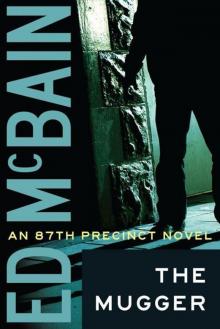 87th Precinct 02 - The Mugger
87th Precinct 02 - The Mugger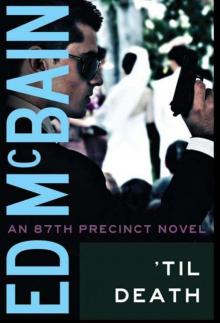 87th Precinct 09 - Til Death
87th Precinct 09 - Til Death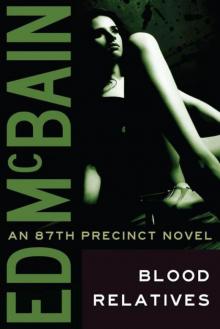 Blood Relatives (87th Precinct)
Blood Relatives (87th Precinct) Killer's Payoff
Killer's Payoff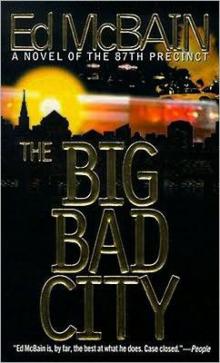 The Big Bad City
The Big Bad City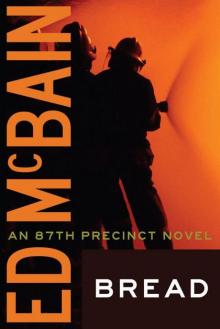 Bread (87th Precinct)
Bread (87th Precinct)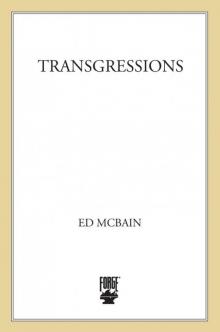 Transgressions Vol. 3
Transgressions Vol. 3 Runaway
Runaway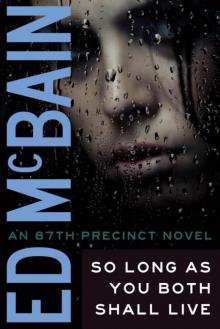 So Long As You Both Shall Live (87th Precinct)
So Long As You Both Shall Live (87th Precinct)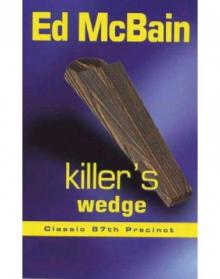 Killer's Wedge
Killer's Wedge